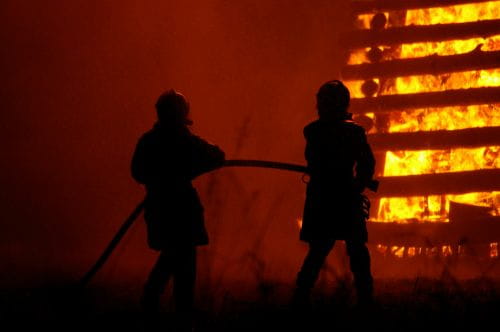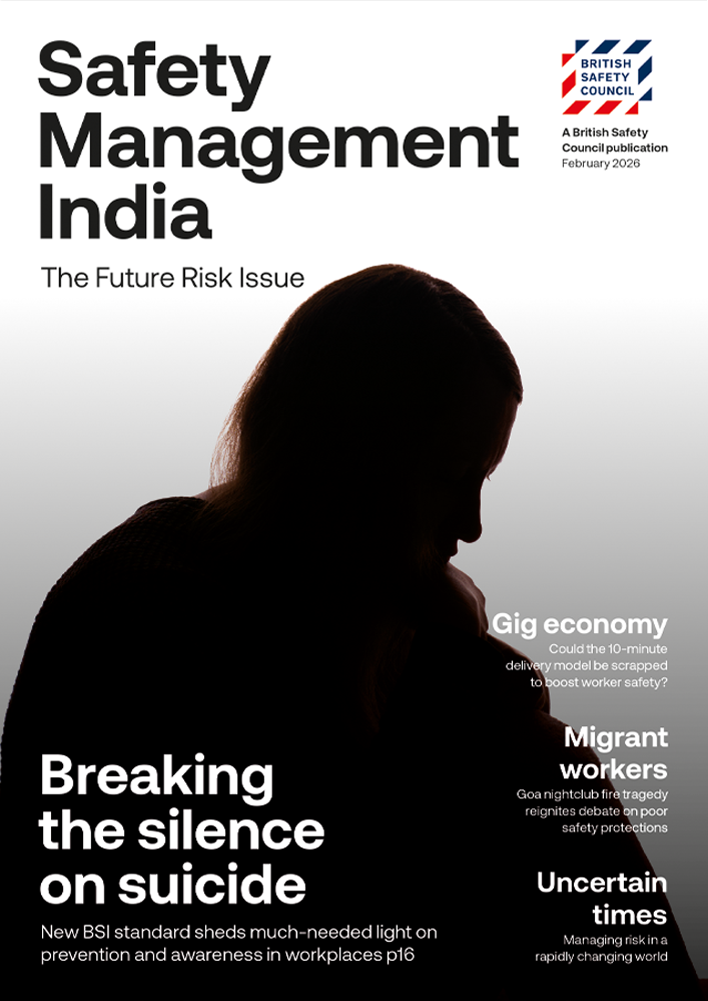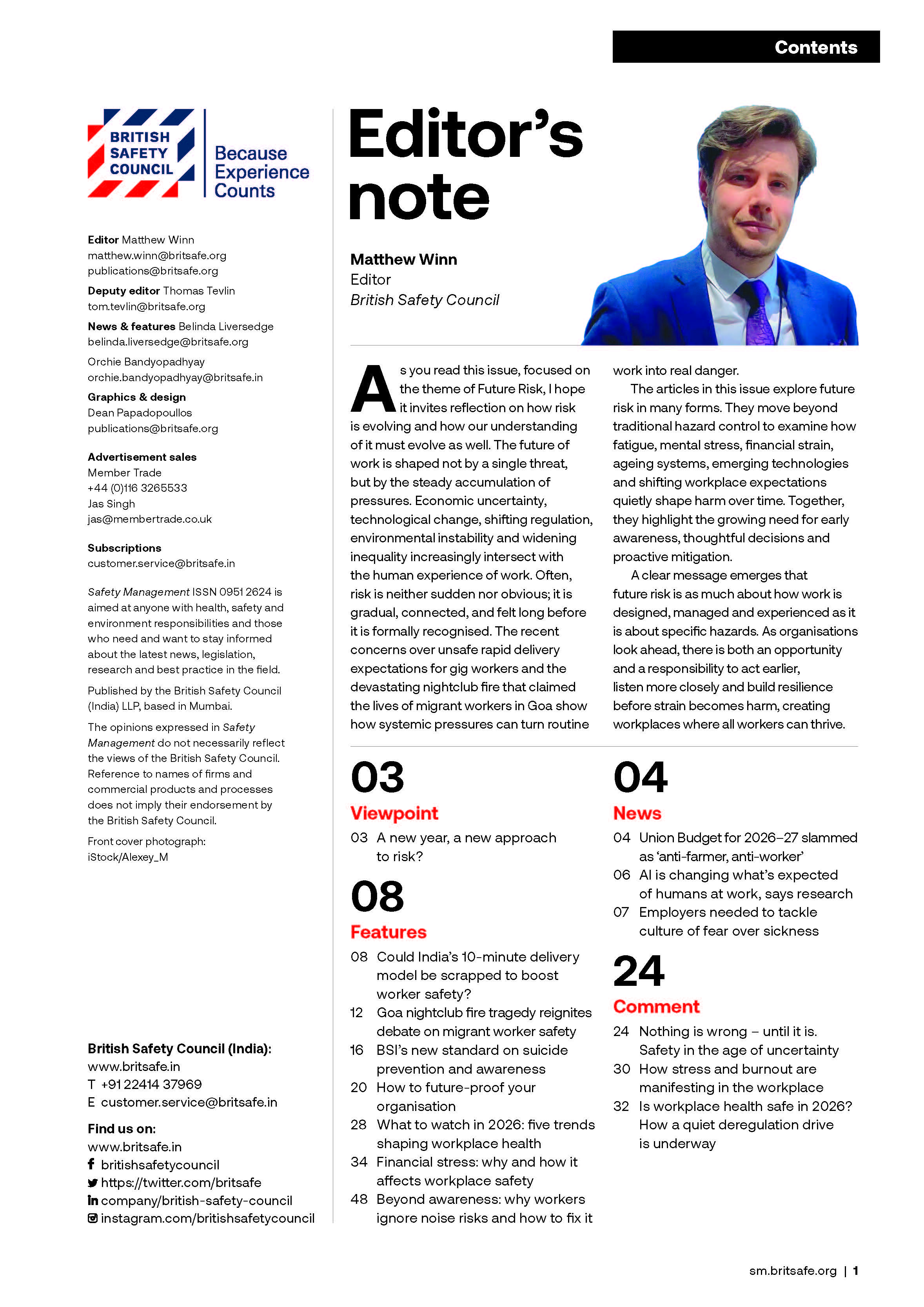Almost daily reports of fatal accidents in India’s factories have prompted renewed calls for government action, but campaigners warn that long-planned changes to India’s safety laws could put workers at even greater risk.
Features
Factory safety: fatality statistics prompt new calls for action
Between 2017 and 2020, three people were killed and 11 were injured each day, on average, due to workplace accidents in India’s registered factories, according to data from the Ministry of Labour and Employment’s Directorate General Factory Advice Service & Labour Institutes (DGFASLI), obtained by the IndiaSpend news website in November 2022 through a Right to Information (RTI) request.
The data further revealed that 3,331 deaths were registered between 2018 and 2020, but only 14 people were jailed for offences under the Factories Act 1948 during the same period.
 Photograph: iStock credit-GCShutter
Photograph: iStock credit-GCShutter
DGFASLI gathers occupational safety and health (OSH) data from state chief inspectors of factories and directors of industrial safety and health. However, these statistics only relate to registered factories in the organised sector, although nearly 90 per cent of workers in India work in the unorganised, informal sector.
Although the Indian government passed a new Occupational Safety, Health and Working Conditions (OSH) Code in 2020 designed to specify minimum health and safety standards in workplaces, critics say the Code is less stringent than the existing Factories Act 1948. The Factories Act places duties on employers to ensure minimum standards of workers’ health, safety and welfare, in premises such as factories of a certain type and where employee numbers are above certain thresholds.
Activists say the OSH Code – which has yet to come into force as states are still framing their legal rules for it – will apply only to factory units that have more than 10 workers if they have an official power connection (electric power), and over 20 workers if they don’t.
However, the Economic Census of 2016 shows that industrial units employing 10 or more workers account for only 1.66 per cent of the total mumber of units in the non-farming sector, which means a majority of establishments – including many factories – will be excluded from the OSH Code’s remit and the health and safety duties the Code places on employers.
OSH Code will relax requirement for safety committees
The OSH Code has also been criticised because it will reduce the threshold at which a factory must set up a safety committee consisting of workers and managers to oversee health and safety in the workplace. Under the Factories Act, a registered factory with 10 or more employees has to establish a safety committee, but under the OSH Code this is due to rise to 250 employees for a hazardous factory and 500 in a standard factory.
According to trade union activists, most industrial accidents in the capital city Delhi are the result of fires from inflammable substances and injuries from power press machines. They add that automobile, chemical and shoe and bag factories are among the most common locations for accidents in the manufacturing sector.
Experts say that many machinery accidents and injuries are preventable as there safety devices that can fitted to machines to instantly switch off the machine if part of a worker’s body comes close to the danger area. “But owners simply don’t install these safety mechanisms to cut costs while arguing that it will reduce the speed of production,” they state.
Activists say workers’ health and safety is viewed by manufacturing companies and factory owners as an inconvenience that they consistently try to avoid. “And they do it for profit, which is the main driving force behind industrial accidents,” add the activists.
Workers in unregistered, small-scale manufacturing units are most vulnerable to accidents and injury because there is almost no administrative intervention into their working conditions and owners are free to cut costs in any way they desire, say campaigners.
Gopal Mishra, from Inquilabi Mazdoor Sangathan, a trade union that operates in Delhi’s Okhla industrial area, says because the proposed OSH code does not apply to small manufacturing units, many owners split their business into multiple small units to avoid being subject to state regulation on health and safety at work.
India had 363,442 registered factories in 2020, of which 84 per cent were operational and employed 20.3 million workers, according to the latest available DGFASLI data. On average, 1,109 deaths and more than 4,000 injuries in registered factories were reported each year, in the four years to 2020, according to analysis of the data by the IndiaSpend news website.
National Human Rights Commission demands government update on progress of OSH code
Following the IndiaSpend news report, in February the National Human Rights Commission (NHRC), a multi-member statutory body formed under the Protection of Human Rights Act 1993, issued notices to the Central, State and the Union Territory governments requesting detailed reports about deaths and injuries of workers due to accidents in factories. In a statement, the NHRC said: “The Commission feels that the gravity of the matter, as highlighted in the newspaper article, raises serious concerns about the human rights of the workers in various business enterprises, including factories.”
The Commission sent the notices to the chief secretaries, principal secretaries and the Department of Labour of all states and Union Territories.
The NHRC also sent a notice to the secretary of the Union Ministry of Labour and Employment asking for a progress report on the action taken to date to implement the OSH Code and the measures that have been taken – or the government intends to take – to improve the human rights and conditions of factory workers across the country.
The response to the NHRC notice is expected in the coming months.
Hundreds of deaths in the manufacturing sector
According to data collected by global workers’ union IndustriALL, in 2021, at least 429 accidents occurred in India’s manufacturing industries, including chemical and pharmaceuticals, mining, and steel, in which more than 352 workers lost their lives and over 700 workers were injured. In 2021, IndustriALL estimated an average of seven accidents were reported every month in Indian manufacturing plants, killing more than 162 workers and leaving others disabled for life or badly injured.
Campaigners say most factory accidents are caused by inadequate or missing safety equipment, inadequate or inconsistent training to workers and compromised safety standards.
Media reports regularly highlight how workers aren’t provided with adequate safety equipment at work – a clear violation of labour laws.
Insufficient safety audits of manufacturing companies
Rajesh Kumar, general secretary of the Indian Federation of Trade Union (IFTU), said the main reason why accidents in factories are so commonplace is there are few or no official audits of manufacturing businesses to check if safety guidelines are being followed and implemented.
IndustriALL says other contributory factors to factory accidents include inadequate numbers of health, safety and factory inspectors and “government-sanctioned slackness in management’s commitment towards safety at workplaces”.
IndustriALL adds: “The state of health and safety further deteriorates as production moves down the supply chain to small and medium enterprises, which face the brunt of cost-cutting by large corporations to maximize their own profits. Meagre fines encourage small and medium enterprises to ignore health and safety standards at the workplace.”
In March 2021, the Union Ministry of Labour and Employment informed Parliament that at least 6,500 workers had been killed while working at factories, ports, mines and construction sites in the previous five years.
Of the total fatalities, 5,629, or over 80 per cent, were reported in factory settings, while 549 deaths took place in mines, 74 at ports and 237 died in central government jurisdiction (central sphere) construction sites.
Experts, however, say that these may be conservative estimates as many cases of injuries and deaths do go unreported, and some work-related deaths are only recorded as injuries, if the person dies a few weeks after the accident.
“Industrial safety is not rocket science and we do not have to reinvent the wheel for every industrial process as time-tested strategies are available in which multiple layers of safety can be built into any process,” said V. Ramana Dhara, an occupational and environmental medicine specialist. He added that the right of citizens to a safe workplace and clean environment can only be achieved if the imbalance of power between citizens and corporations is corrected.
With industrial and factory accidents hitting the headlines daily, campaigners say the Central, State and Union Territory governments need to do much more to tackle poor health and safety standards in the country’s manufacturing sector.
 Photograph: iStock credit Technical Bhadresh
Photograph: iStock credit Technical Bhadresh
Safety inspector numbers ‘woefully inadequate’
Activists warn, for example, that the number of health and safety inspectors is woefully inadequate in comparison to the number of factories in India; that inspector numbers have actually fallen in recent years; and many inspector posts remain unfilled. According to research by the IndiaSpend news website published in Janaury 2023, in 2020, only 69 per cent of 1,040 sanctioned posts for factory inspectors were filled – meaning there was approximately one factory inspector for 412 working factories.
IndustriALL adds that in the past five years, the government has relaxed safety inspections and licensing to allow businesses to self-certify themselves as complying with safety laws and has exempted some companies from reporting on health and safety to ease business burdens and support small enterprises. It adds that the proposed OSH Code will also weaken the role of safety inspectors.
Campaigners say these – and various other – developments have further reduced the incentive for factories to take adequate steps to ensure the health and safety of their workers.
Campaigners are calling for the scope of the OSH Code to be extended to cover smaller factories, the number of safety inspectors to be expanded nationally and steps taken to prevent factory owners removing their premises from the scope of safety laws by outsourcing work and employees to other, smaller units that fall below the minimum staffing numbers where safety laws apply. They also argue that safety committees should be mandatory even for smaller factories.
Activists add that steps also need to be taken to prevent under-reporting of accidents. This includes numerous instances when injured factory workers are taken to private rather than state hospitals for treatment, in an attempt to avoid the legal duty on doctors and factory owners to report work-related fatalities and certain injuries that result in workers being absent from work for certain periods, to the relevant authorities, including the police in certain circumstances.
Commenting after a roundtable in summer 2022, where Indian unions called for immediate government action following a further spate of high-profile industrial accidents, Kemal Özkan, assistant general secretary of IndustriALL, said: “Self-certification under the new labour codes is going to majorly undermine workplace safety in India.
“We must not forget that workers are the real experts on the matter as they face the risks. Workers have the right to know workplace hazards, the right to refuse or shut unsafe work and the right to fully participate in decision-making and implementation of health and safety policies.
“Therefore, we demand that governments and employers must engage with unions as equal partners to better health and safety conditions
at workplaces.”
At the roundtable, Sanjay Vadhavkar, general secretary of the Steel, Metal and Engineering workers Federation of India (SMEFI) and a member of IndustriALL’s executive committee, warned: “The situation is only set to worsen with the new labour code in which the earlier mandatory provisions to ensure workplace health safety have been removed. Now principal employers cannot be subjected to criminal action in case of workers’ death.”
FEATURES

Turning sustainability compliance into business opportunity
By on 27 February 2026
Businesses that publicly demonstrate good sustainability performance can reap financial, reputational and other benefits, but it’s important to minimise the cost of any reporting on sustainability issues and to focus efforts on improving aspects of sustainability where the benefits outweigh the costs.

India’s 10-minute delivery model: why working conditions could be about to improve
By Orchie Bandyopadhyay on 13 February 2026
India’s ‘10-minute’ quick-commerce home delivery model has been criticised for allegedly encouraging reckless riding by delivery workers, but the Government has now reportedly stepped in to urge the app platforms to abandon the time-bound delivery promise and do more to ensure the safety of the sector’s workers.

Migrant workers: Goa fire tragedy reignites debate on poor safety protections
By Orchie Bandyopadhyay on 13 February 2026
A deadly fire at a nightclub in Goa that claimed the lives of 20 migrant workers from across India made global headlines – and triggered fresh demands for government agencies to step up efforts to ensure the safety of low-paid workers in environments such as bars, nightclubs and hotels.



